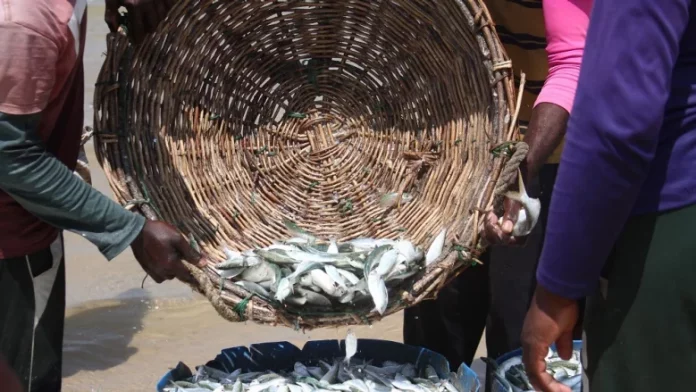The Food and Agriculture Organization (FAO) of the United Nations, backed by funding from the Norwegian government, has initiated a transformative project aimed at bolstering resilience and sustainability in Sri Lanka’s fishing sector.
By equipping a multi-day fishing vessel with advanced cooling technology and a fuel-saving bulbous bow, FAO’s initiative showcases how new technologies can address some of the fishing industry’s most pressing challenges—namely, post-harvest losses, operational costs, and quality control for both local and export markets.
Sri Lanka’s fishing sector, which relies on multi-day fishing boats, plays a critical role in the deep-sea fishing industry and is especially crucial for the export of tuna.
Traditionally, these boats use ice to keep fish fresh during their extended voyages, but this method often compromises fish quality due to temperature inconsistencies, leading to significant post-harvest losses. According to an FAO Fish Loss and Waste (FLW) Assessment conducted between 2022 and 2023, an estimated 41.4% of fish quality is lost in multi-day fisheries in Sri Lanka.
To address this challenge, FAO implemented an advanced cooling system on a newly constructed multi-day fishing boat.
This technology ensures that fish are maintained at ideal temperatures throughout the journey, significantly reducing waste and spoilage.
By strengthening preservation methods, this system allows fishers to deliver high-quality products to market, minimizing loss and enhancing the resilience of their fishing operations.
Fuel consumption is another pressing concern for Sri Lanka’s multi-day fishing boats, which require between 8,000 to 11,000 liters of diesel per trip. This high fuel demand places a financial strain on operators, costing them approximately 3 to 4 million LKR for each voyage.
To alleviate these costs, FAO introduced a bulbous bow technology on the new vessel. This technology, which minimizes wave resistance, enables a remarkable 13% reduction in fuel use.
While the advanced cooling system raises fuel demands, the fuel-saving bulbous bow compensates for this by reducing overall consumption. This dual benefit offers long-term economic advantages for boat owners.
The bulbous bow’s installation, which cost around 1 million LKR, was funded by the boat owner with FAO’s technical assistance, demonstrating how sustainable practices can be embraced through public-private collaboration.
Fair pricing remains a challenge for Sri Lankan fishers, who are often subject to price manipulation by middlemen who leverage gaps in quality knowledge. To empower fishers with greater control over pricing,
FAO introduced an AI-powered mobile application. This tool enables fishers to assess fish quality in real-time according to Yellowfin Tuna export standards, simply by uploading a photo.
By providing immediate quality feedback, the app allows fishers to negotiate fairer prices, enhancing their bargaining power and ensuring equitable market access.
The handover of this technology to the Department of Fisheries and Aquatic Resources underscores FAO’s commitment to a resilient future for Sri Lanka’s fisheries.
By integrating cutting-edge cooling systems, fuel-efficient technologies, and AI-based tools, FAO is not only tackling immediate industry challenges but also promoting long-term economic and environmental sustainability. These advancements empower fishing communities, reduce waste, and optimize operational efficiency, ultimately positioning Sri Lanka’s fisheries sector for a sustainable future
